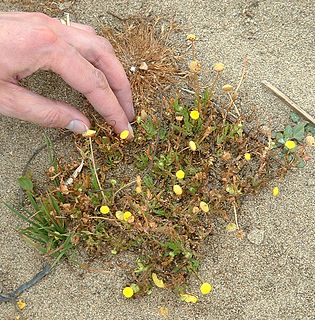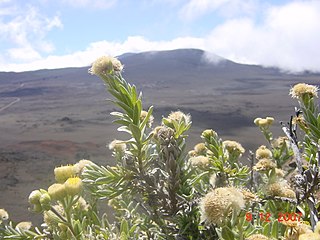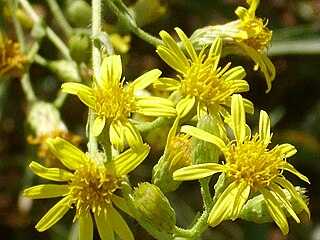
Antidesma is a genus of tropical plant in the family Phyllanthaceae formally described by Linnaeus in 1753. It is native to tropical Africa, S + E + SE Asia, Australia, and various oceanic islands. The greatest diversity occurs in Southeast Asia.

Conyza is a genus of flowering plants in the family Asteraceae.

Pogostemon is a large genus from the family Lamiaceae, first described as a genus in 1815. It is native to warmer parts of Asia, Africa, and Australia.

Chaetocarpus is a plant genus of the family Peraceae, formerly Euphorbiaceae, first described as a genus in 1854. Chaetocarpus species are trees or shrubs. They are native to the Americas, Africa, and Asia. Some species are endangered.
- Chaetocarpus acutifolius(Britton & P.Wilson) Borhidi - Sierra de Moa in Cuba
- Chaetocarpus africanusPax - C Africa
- Chaetocarpus castanocarpus(Roxb.) Thwaites - SE Asia, Yunnan, Assam, Bangladesh, Sri Lanka
- Chaetocarpus cordifolius(Urb.) Borhidi - Cuba, Hispaniola, Jamaica
- Chaetocarpus coriaceusThwaites - Sri Lanka
- Chaetocarpus cubensisFawc. & Rendle - Cuba
- Chaetocarpus echinocarpus (Baill.) Ducke - Bolivia, Brazil
- Chaetocarpus ferrugineusPhilcox - Sri Lanka
- Chaetocarpus gabonensisBreteler - Gabon
- Chaetocarpus globosus(Sw.) Fawc. & Rendle - Jamaica, Cuba, Dominican Rep.
- Chaetocarpus myrsinitesBaill. - Bolivia, Brazil
- Chaetocarpus parvifoliusBorhidi - Cuba
- Chaetocarpus pearceiRusby - Bolivia
- Chaetocarpus pubescens(Thwaites) Hook.f. - Sri Lanka
- Chaetocarpus rabarabaCapuron - Madagascar
- Chaetocarpus schomburgkianus(Kuntze) Pax & K.Hoffm. - Colombia, Venezuela, 3 Guianas, NW Brazil

Crassocephalum is a genus the common names of whose members include ragleaf, thickhead, and bologi. Several species are raised as leaf vegetables and used for medicine, especially in West Africa. Similar to Senecio, but differing in never having ray florets. A calyculus of short bracts is present. The genus is typically thistle-like in appearance, but all parts are soft and not spiny.

Cotula is a genus of flowering plant in the sunflower family. It includes plants known generally as water buttons or buttonweeds.

Psiadia, commonly known as daisy trees, is a genus of mostly woody Asian and African plants in the tribe Astereae within the family Asteraceae. The genus is distributed throughout the Western Indian Ocean, with species reported from continental Eastern Africa, Madagascar, Mauritius, La Reunion, Rodrigues, the Comoro islands, as well as several of the smaller, uninhabited islands in the Mozambique Channel. Additional species are suspected on Socotra and Sri Lanka, but these have not been confirmed. Phylogenetic studies using DNA sequence data and biogeographic reconstruction using molecular dating have shown that the genus originated on the African mainland, and colonized Madagascar and the outlying islands in the Indian Ocean in several independent instances of overwater dispersal in the Miocene.

Pinalia, commonly known as gremlin orchids, is a genus of flowering plants in the family Orchidaceae. Orchids in this genus are large epiphytic or lithophytic plants with prominent pseudobulbs, each with up to three thin, flat leaves and cup-shaped, relatively short-lived flowers with scale-like brown hairs on the outside. There are about 120 species occurring from tropical to subtropical Asia to the south-west Pacific.

Elephantopus is a genus of perennial plants in the daisy family (Asteraceae).

Inuleae is a tribe of flowering plants in the subfamily Asteroideae.
Anisothrix is a genus of flowering plants in the daisy family, Asteraceae.
Gutenbergia is a genus of African flowering plants in the daisy family.
Heteromma is a genus of South African flowering plants in the family Asteraceae.

Jaumea is a genus of flowering plants in the family Asteraceae. The plants are sprawling perennial herbs branching mostly from the base. Flower heads are yellow, with disc flowers and also usually with ray flowers.

Melanthera, squarestem, is a genus of flowering plants in the daisy family, Asteraceae, native to North and South America, as well as Africa, Asia and Oceania, including Hawaiʻi.
Paxia is a genus of plants in the family Connaraceae, first described in 1891. It is native to west-central Africa.

Leucheria is a genus of flowering plants in the aster family.












